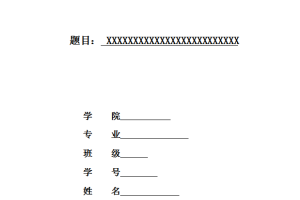This is a thesis over the translation practice of novel Scavenger (Excepts) (Case Ⅰ, Chapter 3 & Case Ⅱ, Chapter 2), the fourth in the series of Medical Examiner Dr.Qin, which was written by the front-line M.E, Qin Ming. The novel will be translated into English. This novel came out in Apr. 2015, and there hasn’t any translation yet.
The origin of Chinese ancient medical jurisprudence can be dated back to the Warring States Period. And it was formed in Tang and Song Dynasty. The most well-known monograph is Record of Redressing Mishandled Cases, written by Song Ci in the Southern Song Dynasty. Published in 1247, it is the first medical jurisprudence monograph in the world, which is about 350 years earlier than the West. The medical jurisprudence in China has a long history and an excellent system. Nevertheless, there are still many stereotypes and misunderstandings in public in China for the limitations of social development and tradition, which restrict, in some way, the development of forensic medicine. The author chose this kind text of high profession in forensic medicine to translate. That will contribute to the exchange in medical jurisprudence between the east and the west to further improve the level of our medical jurisprudence. In the meanwhile, it can help our public know and understand the forensic industry that will promote the development of forensic medicine.
In the course of translation practice, the author chooses proper translation strategy and methods under the guidance of the three principles of functionalist skopos theory: skopos, coherence and loyalty, from the aspects of word, sentence, passage, literary form etc. In this thesis, the translator confirms that the functionalist skopos can guide the translator to practice translating more smoothly through making examples analyzing the problems and difficult points in the course of translating, and the quality of translation.
[Key Words] Functionalist Skopos Theory; Fiction translation; Scavenger; Forensic autopsy
此论文为英语翻译实践报告。本文选取一线法医秦明所著法医专业类系列小说《法医秦明》第四部《清道夫》(节选)(第一案第三章和第二案第二章)内容作为翻译实践源文本,对小说进行汉英翻译。该小说于2015年4月出版,目前暂无中文译本。
我国古代法医学起源于战国时代,形成于唐宋时期。我国古代法医学代表作最负盛名的是南宋的宋慈所撰写的《洗冤录集》,是世界上第一本法医学专著。该书于1274年出版,比西方最早的法医学专著早约350年。我国法医学发展起步早,体系完善。但由于社会发展水平和传统思想的限制,目前国内民众仍对法医行业存在较大的刻板印象和误解,这在一定程度上制约了我国法医学的发展。选取法医类专业性较强的文本进行翻译实践,能够促进中西方在法医专业上的交流,进一步促进我国现代法医学的发展;同时也能加强我国民众对法医这一行业的了解和理解,推动我国现代法医学的发展。
在翻译过程中,笔者遵从功能主义目的论中的目的性、连贯性和忠诚性三原则的指导,从遣词、造句、篇章、文体等几方面出发,选择适合的翻译策略和翻译方法对文本进行翻译。在该实践报告中,译者通过对在文本翻译的过程中出现的问题与难点,以及对翻译成果质量进行分析,通过举例探讨,功能主义目的论在笔者翻译成果中的体现,表明功能主义目的论能够指导译者更好地进行翻译实践活动。
[关键词] 功能主义目的论;小说翻译;《清道夫》;法医尸检





